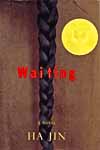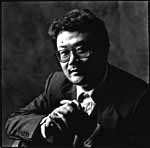|
U.S.-based Chinese writer Ha Jin was tired of waiting
to land a job using his native Chinese skills, so he
began writing in English. His novel Waiting took home
last year's prestigious American National Book Award.
Reading the outpouring of praise
in the international press for Chinese novelist Ha Jin,
one could hardly be blamed for thinking of him as a
passionate and politically driven exile dedicated to
opposing totalitarian rule in his homeland.
Critics liken him to Russia's famous
dissident writer, Alexander Solzhenitsyn, and fans hail
Jin as the new voice of underground China.
But in fact, the 44-year-old Liaoning
province native, whose latest novel Waiting recently
won the prestigious American National Book Award, is
much more interested in simply telling a good story,
particularly in English.
"There are stories I want to tell,"
says Jin, now living in the suburbs of Atlanta, Georgia.
"And writing is something I can do. For many years,
I didn't know what I could do. But I feel most at home
on the page."
Jin became an English-language writer
almost by happenstance.
Fifteen years ago, he won a scholarship
to study American literature in a Ph.D. program at Brandeis
University in Massachusetts. Although his field was
modern American poetry and literature, his eye was on
the Chinese job market.
"I thought I could finish the dissertation
in four years," says Jin, who had been expecting to
return to China by 1990. Work prospects included a research
and teaching job at the Shandong University Institute
of American Literature - where he had worked before
leaving China.
After a year in the States, his six-year-old
son and his wife, Bian Lisha, joined him. Job prospects
in China were grim following the events of 1989, and
there was little reason to go home so he decided to
stay in the U.S.
However, there was an unexpected
casualty: his career. Having devoted two decades to
cultivating a Chinese research and writing career, Jin
suddenly found himself armed with the wrong degree and
the wrong language skills.
"I looked for jobs related to Chinese
- newspapers, translation, teaching," he says in soft-spoken
but heavily-accented English. "Nobody would hire me
because all my degrees were in English literature. So
I decided to write in English."
After completing his dissertation
at Brandeis, Jin enrolled in a fiction writing course
at nearby Boston University. During the course, Ha began
drawing on his (1966-76) Cultural Revolution experiences.
"I think I was perhaps obsessed with
the material," he says. "I felt I could do something
with it. And I had read The Red Cavalry by Isaac Babel
and thought maybe I could write a book like that."
Jin, who served five and a half years
in the People's Liberation Army, enlisted when he was
only 13 because "there wasn't anything to do at the
time."
"We were told there would be a war
between China and the Soviet Union," he recalls. "I
thought, better to join the army rather than wait for
an air raid."
In the writing classes, Jin worked
on what would ultimately become two short story collections
written in stark, simple prose and published under the
pen name Ha Jin. The writer's real name is Jin Xuefei.
He adopted "Ha Jin" because he thought few Americans
would be able to pronounce his real name. "Ha" is short
for Harbin, the northeastern Chinese city where Jin
attended Heilongjiang University.
The first collection, Ocean of Words,
takes an affectionate look at army life on the Sino-Soviet
border in the 1970s. The second, Under the Red Flag,
is confined to the lives of one village called Dismount
Fort. However, both its tone and subject matter are
much harsher than his first work, with strong echoes
of legendary Chinese writer Lu Xun's The True Story
of Ah Q.
Jin admits he was trying to emulate
Lu, writing a "moral history about that place at that
time," but says he was also trying to follow the structures
often seen in Western works, such as James Joyce's Dubliners
or Sherwood Anderson's Winesburg, Ohio stories.
Jin's two books drew widespread praise.
Ocean of Words won the 1997 PEN/Hemingway Award for
Fiction while Under the Red Flag was awarded the Flannery
O'Connor Award for Short Fiction. Accolades introduced
him as a "new dissident writer." Others praised him
as "the first Chinese Communist writer to make fictional
use of daily life under the Party."
Jin shrugs off the political stereotypes.
He's more concerned with working on his craft, and becoming
a man of letters like the subject of his master's thesis
- Robert Penn Warren. He has just secured a Guggenheim
fellowship, affording him a sabbatical from Emory University,
where he normally teaches poetry and writing classes.
He plans to use the time to continue writing his third
novel - about Chinese intellectuals and insanity, and
to finish a third collection of short stories. If that
weren't enough, he has also just completed a third volume
of poems, which will be published later this year.
His achievements are remarkable,
especially considering Jin first learned English from
a radio program while stationed with the PLA on the
Sino-Soviet border and only started writing fiction
10 years ago.
His mentor, Leslie Epstein, recalls
meeting the aspiring author when he started taking writing
classes at Boston University.
"When he started out, he had a poor
command of idiomatic English. He was very hard to understand,"
says Epstein, who is the director of the creative writing
program at the university.
But "he must have applied himself
with the force of a tornado. I would say that he's a
master of English now," says Epstein. "Every now and
then, there's an idiomatic mistake. He sometimes drops
from the international style and uses American-style
colloquialisms like 'wow' or 'pal.' But then he sits
there with a dozen dictionaries trying to work them
out."
Jin conceives his stories in English,
thereby avoiding the pitfalls of translating from Chinese
to English. He also laughs at the suggestion that anyone
helps him write.
"I never ask anybody. I'm a teacher
of writing! That would be a scandal," he says. Instead,
"I always look at dictionaries, at books, at other people's
writing."
But Jin admits it isn't easy. "The
English language is very loose. 'You go to the hospital,'
but 'you go to jail.' Why does one sentence use an article,
and the other not? That kind of thing, there's no logic
to it," says the novelist who does most of his writing
at home. "The more you learn, the more confusing it
becomes. So it has to be resolved case by case. Writing
is like drudgery."
Waiting, a story about a man torn
between two worlds and two women, is breathtaking precisely
for Jin's painstakingly crafted prose. The opening is
textbook-perfect; it elicits the reader's attention
while outlining the story's tension in one short sentence:
"Every summer Lin Kong returned to Goose Village to
divorce his wife, Shuyu."

For this, Jin credits Edith Wharton
and Anton Chekhov, whose theories on starting a novel
he took very seriously: "The first sentence must capture
the center of the drama."
Waiting is based on a story Jin heard
from his wife and in-laws. "The original story was very
simple, but a love story is difficult to write. It's
the most difficult subject in literature. It's hard
to bring anything new to it," he says. "At first, I
didn't understand the depth of the story. Eight years
ago, I couldn't write such a book. It needs skill. It
needs ability to develop the novel," says the writer,
who began the novel in 1994 and finished it four years
later.
In the end, Jin constructed not just
a simple love story but what he calls an allegory of
love.
"It's about a decent man who is not
capable of loving others. And given different situations
and a different social environment, this kind of defect
could have been overcome. He could have developed into
a normal human being, but he was deprived of all those
choices," explains Jin.
"So it has allegorical meanings.
It is not just about Chinese. I am pretty sure there
are American men like that," he adds, laughing.
LuAnn Walther, Jin's editor at Pantheon/Vintage
Books, agrees. "I think there's a really interesting
thing going on that his subject matter is Asia (up until
now), but it's written in a way that people who love
the Western canon can immediately warm to," she enthuses.
"It's very unusual, that he's a voice that's come out
of China but what you're hearing in your head is like
the classics that you've read - Tolstoy, Chekhov, Gogol."
Jin plans to move away from stories
based only on China, and focus more on immigrant life.
"That's the life I experience and
understand better than the recent Chinese life," he
says. A note of urgency creeps into his voice as he
continues, "There are some fundamental issues of language,
freedom and insecurity there. Just imagine the passion
and human desire in the immigrant experience. I think
there's something noble about it. That kind of subject
really moves me."
And besides, he adds, "China has
become unfamiliar to me now. It's distant."
Indeed, the ties to his homeland
appear increasingly tenuous. The novelist, who became
a U.S. citizen in 1997, says he doesn't plan to visit
his native country anytime soon, where his parents and
five siblings still live. Moreover, he rarely writes
in Chinese anymore and has few Chinese friends. But
far from sounding estranged from his origins, Jin takes
everything in stride. In characteristic frankness, he
says, "I think writing in English has alienated me from
many Chinese. We don't have the same interests anymore."
He concludes, however, on a very Chinese note, "Language
divides the saltwater and freshwater fish."
| 


